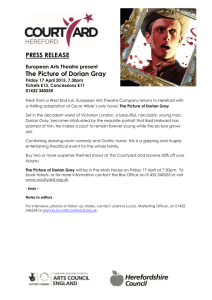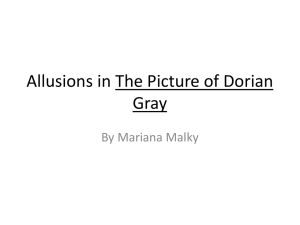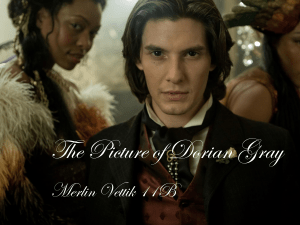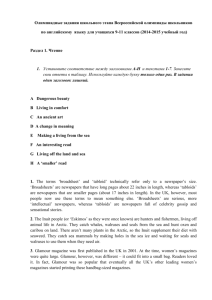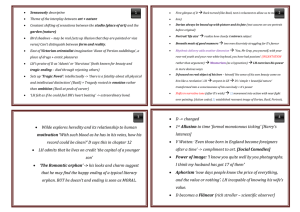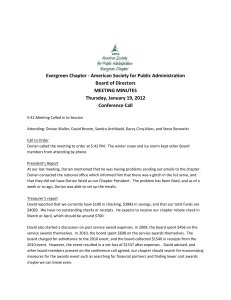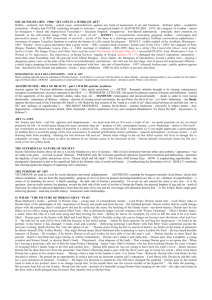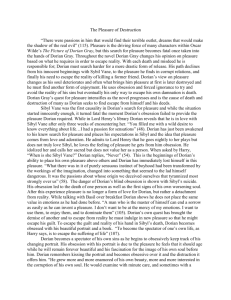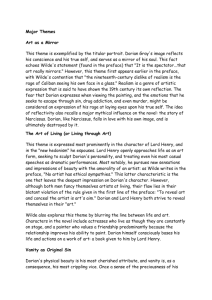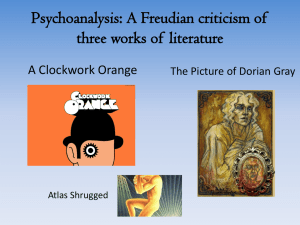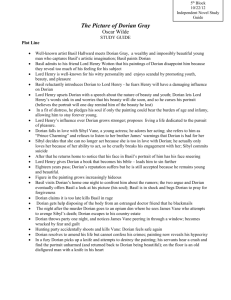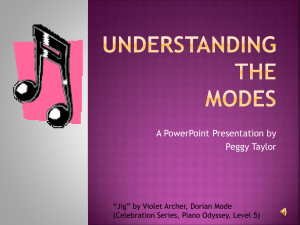The Picture of Dorian Gray Theme of Appearances
advertisement
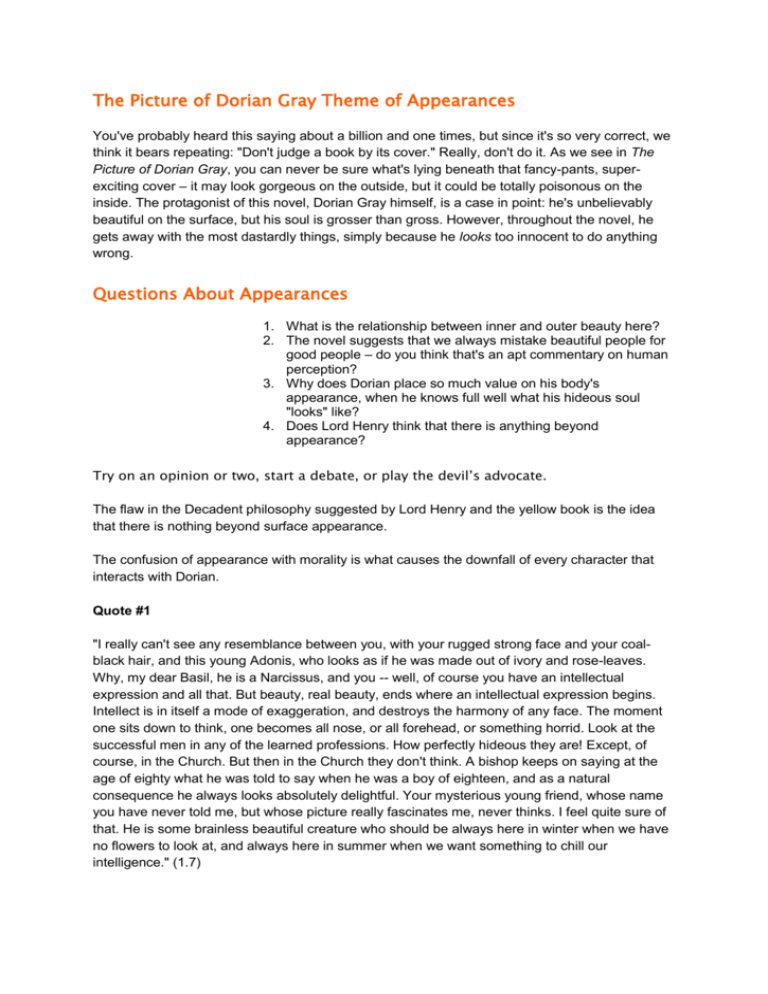
The Picture of Dorian Gray Theme of Appearances You've probably heard this saying about a billion and one times, but since it's so very correct, we think it bears repeating: "Don't judge a book by its cover." Really, don't do it. As we see in The Picture of Dorian Gray, you can never be sure what's lying beneath that fancy-pants, superexciting cover – it may look gorgeous on the outside, but it could be totally poisonous on the inside. The protagonist of this novel, Dorian Gray himself, is a case in point: he's unbelievably beautiful on the surface, but his soul is grosser than gross. However, throughout the novel, he gets away with the most dastardly things, simply because he looks too innocent to do anything wrong. Questions About Appearances 1. What is the relationship between inner and outer beauty here? 2. The novel suggests that we always mistake beautiful people for good people – do you think that's an apt commentary on human perception? 3. Why does Dorian place so much value on his body's appearance, when he knows full well what his hideous soul "looks" like? 4. Does Lord Henry think that there is anything beyond appearance? Try on an opinion or two, start a debate, or play the devil’s advocate. The flaw in the Decadent philosophy suggested by Lord Henry and the yellow book is the idea that there is nothing beyond surface appearance. The confusion of appearance with morality is what causes the downfall of every character that interacts with Dorian. Quote #1 "I really can't see any resemblance between you, with your rugged strong face and your coalblack hair, and this young Adonis, who looks as if he was made out of ivory and rose-leaves. Why, my dear Basil, he is a Narcissus, and you -- well, of course you have an intellectual expression and all that. But beauty, real beauty, ends where an intellectual expression begins. Intellect is in itself a mode of exaggeration, and destroys the harmony of any face. The moment one sits down to think, one becomes all nose, or all forehead, or something horrid. Look at the successful men in any of the learned professions. How perfectly hideous they are! Except, of course, in the Church. But then in the Church they don't think. A bishop keeps on saying at the age of eighty what he was told to say when he was a boy of eighteen, and as a natural consequence he always looks absolutely delightful. Your mysterious young friend, whose name you have never told me, but whose picture really fascinates me, never thinks. I feel quite sure of that. He is some brainless beautiful creature who should be always here in winter when we have no flowers to look at, and always here in summer when we want something to chill our intelligence." (1.7) Lord Henry is of the opinion that everything that matters exhibits itself in appearance, as though a person's thoughts and personality have some influence over the alignment of their features. Quote #2 The painter bit his lip and walked over, cup in hand, to the picture. "I shall stay with the real Dorian," he said, sadly. "Is it the real Dorian?" cried the original of the portrait, strolling across to him. "Am I really like that?" "Yes; you are just like that." "How wonderful, Basil!" "At least you are like it in appearance. But it will never alter," sighed Hallward. "That is something." (2.34) Huh…Basil's wistful comment hits closer to home than he can possibly realize at this stage. The portrait is the real Dorian – more real than its artist can even conceive of. So real, in fact, that it has to alter eventually… Quote #3 "You can dine with me to-night, Dorian, can't you?" He shook his head. "To-night she is Imogen," he answered, "and to-morrow night she will be Juliet." "When is she Sibyl Vane?" "Never." "I congratulate you." Of course Lord Henry would congratulate Dorian for this. After all, he only values things because of their appearance, and a girl who is all appearance (and no inner self) would be perfect, in his eyes. Quote #4 Mrs. Vane glanced at her, and with one of those false theatrical gestures that so often become a mode of second nature to a stage-player, clasped her in her arms. At this moment, the door opened and a young lad with rough brown hair came into the room. He was thick-set of figure, and his hands and feet were large and somewhat clumsy in movement. He was not so finely bred as his sister. One would hardly have guessed the close relationship that existed between them. Mrs. Vane fixed her eyes on him and intensified her smile. She mentally elevated her son to the dignity of an audience. She felt sure that the tableau was interesting. (5.10) Appearances are also paramount in Mrs. Vane's valuation of things. She only thinks about the theatrical elements of life, and constructs her version of reality out of surface appearances and acts. Quote #5 As for Sibyl, I do not know at present whether her attachment is serious or not. But there is no doubt that the young man in question is a perfect gentleman. He is always most polite to me. Besides, he has the appearance of being rich, and the flowers he sends are lovely […] He has not yet revealed his real name. I think it is quite romantic of him. He is probably a member of the aristocracy […] I trust he is one of the aristocracy. He has all the appearance of it, I must say. It might be a most brilliant marriage for Sibyl. They would make a charming couple. His good looks are really quite remarkable; everybody notices them." (5.13) Again, we see that Mrs. Vane simply relies upon appearance (like so many of the characters we meet here) as truth. Not wise! Quote #6 "Dorian, this is horrible! Something has changed you completely. You look exactly the same wonderful boy who, day after day, used to come down to my studio to sit for his picture. But you were simple, natural, and affectionate then. You were the most unspoiled creature in the whole world. Now, I don't know what has come over you. You talk as if you had no heart, no pity in you. It is all Harry's influence. I see that." The lad flushed up and, going to the window, looked out for a few moments on the green, flickering, sun-lashed garden. "I owe a great deal to Harry, Basil," he said at last, "more than I owe to you. You only taught me to be vain." "Well, I am punished for that, Dorian -- or shall be some day." (9.2-3) This cold exchange between Basil and Dorian expresses the danger in mistaking outer beauty for inner beauty. Poor Basil is just realizing that the Dorian before him really is totally different from the Dorian he captured in paint. There's an interestingly prescient note in his declaration that he is or will be "punished" for showing Dorian his own beauty – he tragically doesn't know how true these words will be. Quote #7 […] the wonderful beauty that had so fascinated Basil Hallward, and many others besides him, seemed never to leave him. Even those who had heard the most evil things against him -- and from time to time strange rumours about his mode of life crept through London and became the chatter of the clubs -- could not believe anything to his dishonour when they saw him. He had always the look of one who had kept himself unspotted from the world. Men who talked grossly became silent when Dorian Gray entered the room. There was something in the purity of his face that rebuked them. His mere presence seemed to recall to them the memory of the innocence that they had tarnished. They wondered how one so charming and graceful as he was could have escaped the stain of an age that was at once sordid and sensual. (11.3) Dorian's eternally fresh, innocent, and pure appearance is more powerful than the grotesque rumors that surround him as the years pass. We see that the world, not just Dorian, also places inconceivably high value on good looks. Quote #8 Certainly no one looking at Dorian Gray that night could have believed that he had passed through a tragedy as horrible as any tragedy of our age. Those finely shaped fingers could never have clutched a knife for sin, nor those smiling lips have cried out on God and goodness. He himself could not help wondering at the calm of his demeanour, and for a moment felt keenly the terrible pleasure of a double life. (15.1) Dorian loves the feeling of secret sin that he gleans from his "double life." The knowledge of his terrible crime is his guilty pleasure. Quote #9 When they entered, they found hanging upon the wall a splendid portrait of their master as they had last seen him, in all the wonder of his exquisite youth and beauty. Lying on the floor was a dead man, in evening dress, with a knife in his heart. He was withered, wrinkled, and loathsome of visage. It was not till they had examined the rings that they recognized who it was. (20.18) Finally, Dorian's mask is lifted, and his true self is revealed – justice is served.
